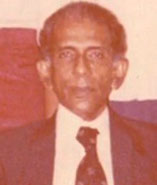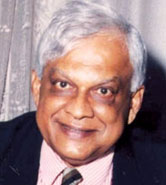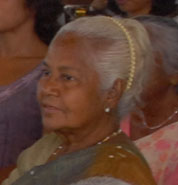For though from out our bourne of Time and Place
The flood may bear me far,
I hope to see my Pilot face to face
When I have crossed the bar
--Tennyson (Crossing the Bar)
The first thing that comes to mind when I remember my grandfather is a faded photograph. I must be around 13, we’re standing at the Trincomalee harbour. The sun is in my eyes and I’m squinting at the camera, one hand on my wind-tousled hair. But my grandfather is standing tall and proud. With his signature hat (he never went for walks without it), pressed shirt and a firm grip on his walking stick, he’s a sight to behold. It’s this picture which is etched in my memory and the one I will always remember him by.
 |
It’s a little hard to believe that it’s been a year since he died. My grandfather, O.L.M. Ismail was born in Muthur, he studied at St. Joseph’s College, Trincomalee and later at the Law College. Instead of settling down in Colombo and pursuing his legal career, he chose to go back to his home town specializing in civil law. Having taken oaths as a proctor in 1945, he went on to practise for 65 years in the Trincomalee courts and was instrumental in building the new court complex there. His dynamic personality, hospitality, wit and charisma combined with a gentle demeanour drew people to him and the gentility and calm wisdom with which he handled his clients earned the respect of peers and superiors, alike.
He was director of the Paddy Marketing Board, member of the Waqf board, and a member of the Muslim Scholarship Fund. He also served as the President of the Trincomalee Muslim Development Fund, President of the Scout Movement, Trincomalee and President of the Old Boys’ Association of St Joseph’s College, Trincomalee. A dynamic social worker, he was involved in starting Ahadiya Schools in the Trincomalee district and played an active role in starting Zahira College, Trincomalee and the YMMA Trincomalee Branch.
Despite the war, most of my holidays were spent in Trincomalee. From walks along the harbour, sitting down to piping hot meals, discussions about books or simply lounging in the verandah - my memories of Trincomalee are deeply intertwined with that of my grandfather.
A voracious reader with an impeccable command of both English and Tamil, one of the things I will miss most about him are the letters he used to send. Sometimes a typewritten epistle of congratulations or more often an article or poem which he found interesting and wanted me to read. In an age of hurried emails and text messages, receiving letters from him was a pleasure and I eagerly looked forward to each one. It was he, who helped foster my love for reading and writing. He always encouraged us (his grandchildren) to dream big.
He took pride in his family and constantly supported and encouraged us in all our endeavours – both big and small. Whether it was an exam, an interview or simply a hard day, his unending faith in us and encouragement and prayers were invaluable to us. Despite the geographical difference, he would always make it a point to call each and everyone in the family to inquire about our day or even just to wish us a good morning.
I speak on behalf of his children, grandchildren and family members alike when I say that I miss him with all my heart. We were truly blessed to have him in our lives. May Allah grant him Jennathul Firdouse.
Adilah Ismail
A good physician
whose ‘seedevi’ ways
touched many
Soma De Sylva
It is hard to imagine that my good friend and colleague Soma is no more.
She had the brightness and vivacity (and a special quality best described by the Sinhala term “seedevi”),which made one discount the health problems she had for the last few years of her life.
Despite this she always showed selfless concern for her friends and relatives and made it a point to visit her cousin, 92-year-old, Dr. Stella de Silva every week until her final illness.
Soma was an exemplary physician, wife and mother. Much loved and respected by her patients, staff and students, she retired early so that she could join her husband Ranjan who was posted as a WHO consultant to Delhi. There she indulged in her hobby of crochet and brightened up their flat with her place mats.
On their return from Delhi, she bestowed the same TLC on her garden and dogs as she did on her patients.
The last time I visited her, her garden was ablaze with blooms—red anthuriums, blue plumbago and yellow ixora.
Soma together with her husband were devout Buddhists—well versed in the Buddha Dhamma, which they studied at the Buddhist University.
Her faith and her husband’s support helped her no doubt to cope with her illness.
I, my husband and daughters were indeed fortunate to count her as a friend and we shall miss her.
Premini
Six years ago, a crocodile saved him from the tsunami, today only fond memories remain
Upali Gunesekara
Upali Gunesekara passed away on January 10 at the age of 81. During the past couple of years, he had been ailing. But even when tormented by illness, he did not sulk. He maintained his characteristic unruffled disposition. His selfless concern for his family and friends was admirable.
The sudden demise of his sister, whom he loved dearly, a year ago, probably, had an adverse effect on his health. He was a loving brother to his siblings. They adored him and respected him.
Upali received his education at Richmond College, Galle. He loved his alma mater dearly. After leaving school, he ventured into business. What was most characteristic about him was his charming and affable personality. As a human being and businessman, he was of a different mould.
He was a businessman with a rare and enviable code of ethics and was always mindful of the welfare of his employees.
I came to know him in April 1971 during the formative years of the Sri Lanka Volunteer Air Force. When the Volunteer Air Force was formed in the wake of an armed insurrection he was one of the first to join. He served the force with dedication and distinction. I was privileged to have closely associated with him.
Appointed as the officer commanding Squadron No 103, he displayed a remarkable sense of dedication to duty and exemplary concern for his men. Although a volunteer officer, Upali epitomised the model officer and perfect gentleman -- a strict disciplinarian with a kind heart. He was well dressed whether in uniform or in civvies. He commanded the respect of his subordinates as well as his superiors.
Upali was a great lover of nature. His home, "Lands End", was situated in picturesque surroundings bordering the lake. He enjoyed life, caring for and feeding animals and birds. The extraordinary and astonishing story of how, when he was swept away by the tidal waves during the 2004 tsunami a crocodile, whom he used to feed daily, saved him received wide publicity in the print and electronic media. It was indeed a manifestation of gratitude.
He is no more, but his memories will always remain with those who are privileged to have associated with him. I shall always cherish fond memories of Upali. A kind and sincere personality, he was witty and generous to a fault. He helped many volunteer airmen who were without a job after demobilization to find jobs. In some cases, he helped their children find jobs.
The god-like legacy he has left behind will be an inspiration and a comfort to the near and dear, who were saddened by his demise.
May he attain the supreme bliss of nirvana!
Rex Fernando
He was every inch a great scholar
Ranaweera Leslie Gunawardana
Ranaweera Leslie Gunawardana (Leslie to his friends), one of the bright lights of the University of Peradeniya is no more. It would take quite some time for us, - indeed he was my friend and colleague for over fifty years – to reconcile ourselves to the fact that this great scholar, probably one of the brightest of contemporary Sri Lanka, has departed for good. Being the most outstanding student at the University Entrance Examination (1956), he was awarded a scholarship apart from one more, a Government scholarship, to finance his undergraduate studies.
 |
At the B.A. Final Examination, Leslie gained First Class Honours in History and carried away as many as four awards in a row, consisting of the much coveted scholarships and prizes. What is indeed the more remarkable and noteworthy, is the fact that he never allowed the brilliant start to loosen its momentum and fizzle out into a lack-lustre pale trudge. The contributions made by the emeritus professor to unravel Sri Lanka’s past, including, on occasion, that of the adjacent Asian lands, too, stand out in bold relief. He was at once a highly respected historian both in Sri Lanka and abroad.
Leslie began his academic career in 1960 as an Assistant Lecturer in the Department of History, University of Ceylon, (Peradeniya), and in due course in 1982, on the basis of a merit promotion, he was appointed to a Personal Chair in History. Subsequently he was elevated to the position of Dean of the Faculty of Arts (1991), before he reached the pinnacle as Vice Chancellor (1997-2000) of the University from which he had graduated. Right through he had an interest in left-leaning politics. He was appointed the Minister of Science and Technology in the administration of President Chandrika Kumaratunga. I should, however, note that at no time did he allow political discourse to dilute the rigour of academic discipline.
The life and work of Leslie present a range of achievements, which cannot possibly be compressed into a brief statement such as this. His publications, in the form of books and research papers, add up to a total of well over one hundred. Similarly, the seminars and conferences which he had addressed over the years are amazingly extensive. Very many of them are indeed prestigious international centres of learning such as London, Cambridge and Oxford, Chicago, New Delhi and Tokyo. His research deals with a variety of complex issues like the structure of the state, ancient and medieval science and technology of Sri Lanka, ethnic issues, historiography, Buddhist monastic organization of Sri Lanka with special reference to economic interest, and so on. His work is of lasting value, in the sense that, despite the intricate problems arising from pre-colonial sources of information, he found his way into the deepest nooks and corners of the past, with the aid of his powerful searchlight. His work was meticulously thorough and reliable.
Heading the list of publications as a major item is his book, Robe and Plough: Monasticism and Economic Interest in Early Medieval Sri Lanka which is his doctoral thesis accepted by the University of London (1965). In this book, the author examined with amazing skill, the intricacies of the management of extensive monastic estates which belonged to the Sangha, the proceeds of which were utilized for the maintenance of vast communities of the Buddhist order and its monastic properties. Anyone who would like to know more about it may read the detailed review in my book, Society State and Religion in Premodern Sri Lanka, which I consider a fitting tribute to this great scholar.
As remarkable as his scientific approach to the study of history, is the significance of the choice of research themes. Most impressive indeed is the work he had begun on a promising scale, on the development of science and technology in ancient and early medieval Sri Lanka. He has to his credit five excellent research papers in this field: 1. Hydraulic Engineering in Ancient Sri Lanka: the Cistern Sluice 2. Inter-Societal Transfer of Hydraulic Technology in Pre-colonial South Asia: Some Reflections based on a Preliminary Investigation 3. Craftsman as Artist and Innovator in Early Medieval Sri Lanka: Two Lamps with Hydrostatically controlled Oil Reservoirs from Dedigama 3. Immersion as Therapy: Archaeological and Literacy Evidence on an Aspect of Medical Practice in Pre-colonial Sri Lanka 5. Obstetrics and Theories of Reproduction in Ancient and Early Medieval Sri Lanka. These studies, notably those on hydraulic technology, medicine and medical practice are distinct original contributions to the study of science and technology in pre-colonial Sri Lanka.
Equally important are Leslie’s contributions to the study of Sri Lanka’s pre-colonial social organization and Buddhist institutions. Robe and Plough, cited above, is an outstanding work, a model for research in the history of Buddhist Monasticism, with special reference to economic interest. Again, he draws our attention to the oldest extant Sinhala manuscript, (12th century, Karma-Vibhagaya, discovered by Rahula Sankrtya- yana) in a Tibetan monastery. It rises to great importance, when one admits how little is known of the chronology of the hundreds of ola-leaf manuscripts, written in Sinhala and Pali, found deposited in our monastic and non-monastic libraries.
Quite early in my own career, as a student at the University of Ceylon, Peradeniya (1954-1958), I had planned a book on the Anuradhapura Period of Sri Lankan History (Anuradhapura Yugaya), to meet the need for reading material in Sinhala, with the transition of the media of instruction from English into Sinhala and Tamil in the mid- fifties of the past century. I am pleased to record in retrospect, how Leslie who arrived in Peradeniya two years later in 1956, happily joined me as a collaborator in this project. It was published by the Vidyalankara University of Kelaniya in 1961, where I was a member of it academic staff from 1959. He contributed two chapters on political developments and South Indian Invasions respectively, in its enlarged and revised edition of 1965 (reprinted 1987), filling a gap in the original text. This was the beginning of a lifelong link as friend and colleague.
It needs to be stated that Leslie has to his credit publications, both in English and Sinhala, while, understandably, most research papers are in English. Apart from the joint venture referred to above, and Sivura saha Nangula, among Sinhalese works, perhaps less-noted but immensely valuable is his work on the evolution of the historical discipline, (Itihasaye Atitaya), placed in its widest spectrum. It is a substantial volume dealing with a theme, on which no noteworthy publication had appeared previously. One other item which calls for inclusion is Reflections on a Heritage: Historical Scholarship on Premodern Sri Lanka, Vol. I, Part 1 (2000), a symposium of select writings of past and present scholars, brought out by a dedicated committee of senior scholars, of which he was a member. A Sinhalese translation of this work is available, too. Before proceeding further, let me hasten to add that, I have picked up only a few of the more noteworthy and representative items of writing out of a long list, with a view to highlighting the calibre of his scholarship, taking into account the limited space available to me.
When I conclude this note of appreciation, it occurs to me that, while little or nothing is said of the men and women who had served their community with such distinction and devotion when they are alive, the loss is highlighted and songs of praise are sung when they are dead and gone! Personally, I am relieved that my tributes to this great scholar were paid when he was alive and well, and they are available in print, both in English and Sinhala. Still on a personal note, even more assuaging is the fact that I had visited Leslie and spoken to him at his bedside, weeks before his condition deteriorated irretrievably. One more comment: Personal idiosyncrasies, if he had any, are his own. Of this there can be no dispute; he was every inch a great scholar.
Our condolences go out to his beloved wife, Viru Gunawardana, herself a Senior Professor in the Faculty of Veterinary Medicine and Animal Science in the same university, who obviously shared his joys and sorrows all the way, caring for him during his illness in the final weeks, as well as to his beloved son, Asela and his wife. I stated at the beginning of this note of appreciation, that it would be very difficult for us to reconcile ourselves to the reality of the death of this great scholar. Perhaps the only way out is to reflect upon the eternal fact that ‘Life is uncertain, death is certain’, jivitam aniyatam, maranam niyatam!
Amaradasa Liyanagamage
|




